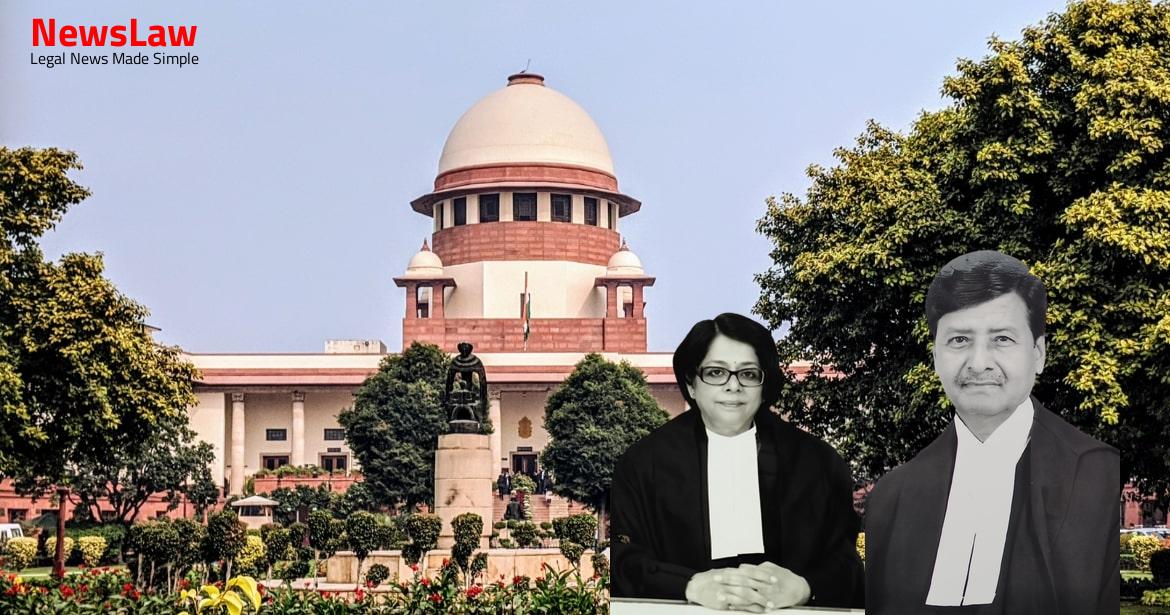Delving into the intricate legal analysis by the courts regarding the overlap between civil breaches and criminal offenses. This summary focuses on the recent judgment that navigated the boundaries of contractual disputes and potential criminal implications. Stay tuned to unravel the complexities of legal proceedings and the delicate balance sought by the judiciary.
Facts
- An FIR was registered against Appellant No 1 and 2 for offences under section 420 read with 34 of Indian Penal Code due to the sale of flats allegedly in excess.
- Respondent No. 2 filed a police complaint stating that the sale of flats exceeded the agreed share between the parties.
- Respondent No. 2 issued a letter revoking the GPA as the company did not adhere to the terms of the JDA.
- A sale deed for another flat was executed in favor of Smt. Yashoda Sundararajan.
- An MoU was entered into by Respondent No 2 with the builder company, authorizing the sale of 8000 sq. ft out of Respondent No. 2’s share.
- The JDA was initially executed on 07.08.13 by Respondent No. 2 and the company of the Appellants, Rajarajeshwari Buildcon Private Ltd.
- The company contended that the payments made to Religare Finvest Ltd. could be adjusted by selling additional flats beyond its share of 8000 sq.ft.
- Appellant No 1 died, and his name was deleted from the case.
- Arbitration proceedings partly allowed the claims of Appellants and Respondent No 2.
- General Power of Attorney (GPA) and Supplementary Agreement were executed in furtherance of the JDA.
- Charge sheet was filed against the Appellants for various offences under IPC.
- Sale deeds were executed for two flats in favor of Respondent No. 2’s family members.
- Appellants filed a petition for arbitration under section 9 of the Arbitration Act.
- Arbitrator ruled that revocation of GPA by Respondent No. 2 was illegal and company had the right to sell flats per the MoU.
- The issue of sale of excess flats by the Appellants was left unanswered in the arbitral award as Respondent No. 2 withdrew his claim.
- Respondent No. 2 challenged the arbitral award under section 34 of the Arbitration Act.
- High Court observed that the criminal complaint cannot be quashed as the issue of flat sale was not addressed in arbitration.
- Appellants approached the Supreme Court through a Special Leave Petition against the High Court’s decision.
- Appellants argued that the criminal complaint is being used to settle a civil dispute and should be quashed.
- Appellants cited a judgment to support their contention that the complaint lacks the ingredients of a criminal offence.
- Appellants claimed that Respondent No. 2 did not deny the MoU or marketing rights granted to them.
- Appellants asserted that since variations were not in writing, the transactions were wrongly portrayed as criminal.
- Appellants sought to obtain NOC and make payments as per the MoU terms.
- Appellants filed a petition to quash the FIR in the High Court under Section 482 of CrPC based on the above grounds provided.
Also Read: Assessment of Loss of Earning Capacity in Motor Accident Claim
Issue
- Examination of whether the ingredients of offences punishable under Sections 406, 419, and 420 are prima facie established.
- Determining whether the dispute is solely of a civil nature and thus subject to being quashed.
Also Read: Enhancement of Compensation in Workmen’s Compensation Act Case
Arguments
- The sale of 4 flats beyond the 9 flats allotted to the Appellant’s company led to a complaint of cheating by Respondent No 2.
- The dispute between the parties was previously adjudicated by an arbitrator, making the existing criminal complaint subject to being quashed.
- Respondent No 2 argues that the developer company of the Appellants illegally sold 13 flats instead of the permitted 9.
- Citing State of Karnataka Vs. M. Devendrappa & Anr., Respondent No 2 emphasizes that the focus should be on whether the complaint outlines criminal offenses and not on potential defenses that could lead to acquittal.
- Respondent No 1 argues that the High Court found clear allegations of unauthorized sale of flats by the Appellants, justifying criminal charges.
- Respondent claims that offenses under sections 406, 419, and 420 IPC are established based on the facts presented.
- It is contended that the sale of excess flats, without authorization, constitutes criminal offenses, not just a breach of contract.
- Respondent No 2 asserts that the Appellants cannot avoid criminal liability by citing civil disputes or arbitration processes.
- The reliance on previous court judgments is discussed to support the standpoint that criminal proceedings are justified in this case.
Also Read: Legal Analysis: Quashing of FIR and Criminal Proceedings
Analysis
- The Appellants argue that the dispute is a mere breach of contract and not criminal in nature.
- The High Court’s decision to quash criminal proceedings was unjustified.
- The Appellants exceeded their authority by selling four additional flats, indicating criminal intent.
- Arbitration was sought for breach of agreement but cannot address criminal offenses.
- The High Court’s reasons for quashing the complaint were deemed insufficient in law.
- The Appellants’ actions do not show deceptive intent to sell excess flats.
- The dispute involves civil suits but does not warrant criminal implications.
- Criminal proceedings cannot be a shortcut for other legal remedies available.
- Dishonest or fraudulent intention was not established against the Appellants.
- Agreements for arbitration cannot substitute criminal prosecution for offenses.
- The facts presented do not exempt the commercial transaction from potential charges of cheating.
- It depends on the intention of the accused at the time of inducement
- Mere breach of contract cannot quash criminal proceedings
- There is a growing tendency to convert civil disputes into criminal cases
- Jurisdiction under Section 482 of CrPC should be used sparingly to prevent abuse of process
- Distinguishing between breach of contract and cheating is fine and pre-emption of investigation justified in extreme cases
- Criminal proceedings must not be used as instruments of harassment
- Different categories where inherent powers can be exercised by the court for securing justice
- The complaint against the Appellants involves criminal breach of trust and cheating.
- Criminal breach of trust involves misappropriation of another’s property for personal use with dishonesty.
- Cheating involves having a dishonest or fraudulent intention to induce delivery of property to a specific person.
- Section 415 of the Indian Penal Code defines cheating, while section 405 defines criminal breach of trust.
- Cheating by personation is punishable with imprisonment up to three years, fine, or both.
- The Court disapproves of imparting criminal color to a civil dispute
- Taking advantage of a quick relief granted in a criminal case for a civil dispute is deemed an abuse of the process of law
- Such practices must be discouraged entirely
Decision
- Order dated 13.08.2019 passed by the High Court of Karnataka set aside.
- Appeal allowed as a result.
- Impugned F.I.R. No 185 of 2016 dated 29.03.2016 quashed.
- Proceedings in C.C.No. 20609 of 2017 on the file of VI Additional CMM, Bengaluru, quashed.
- Charge sheet dated 29.03.2017 against the appellants for offences under Sections 406, 419, 420 read with Section 34 IPC stands quashed.
Case Title: MITESH KUMAR J SHA Vs. THE STATE OF KARNATAKA (2021 INSC 675)
Case Number: Crl.A. No.-001285-001285 / 2021



